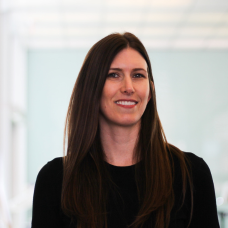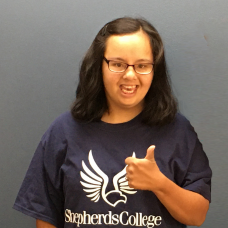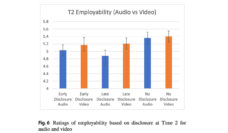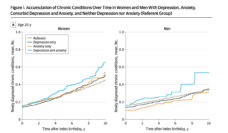People with intellectual and developmental disabilities have almost always been subjects of research, excluded from being researchers themselves. Stemming from a history marked by unethical treatment and experimentation, research practices have emphasized protection while minimizing the capacity of people with disabilities to make meaningful research contributions beyond being study participants. While inclusive research is a growing practice to address this gap, it is still underutilized for people with intellectual and developmental disability.
Co-research deliberately includes people from groups being studied as members of the research team. This method creates opportunities for people with intellectual and developmental disabilities to become researchers themselves, reinforcing the disability rights slogan “nothing about us without us.” Co-researchers bring lived experience and critical insights to research questions and study design.
Our team of seven adults with Down syndrome and 3 graduate research assistants, led by Dr. Eric Rubenstein, convened in 2022 with the goal of fostering opportunity for inclusiveness and impact. The co-researchers all had experience in self-advocacy and were interested in joining a research team. Eden Rapp, one of the co-researchers with Down syndrome, explained her reason for joining by stating, “I am on this team because I am interested in research and learning more about health for people with Down syndrome. I am curious about my own behaviors and finding out about myself, too.”
[O]ur co-research team furthers the impact of a co-research model beyond our members, contributing to a broader dissemination of inclusive research practices.
Eden draws a personal connection to our research and highlights the passion for creating positive change that co-researchers bring to the team: “I like how we change lives for the better. We just finished a survey project about mental health, and the next health problem we are going to be focusing on is independence for people with Down syndrome. It is our job to think of questions that we can ask other co-researchers and make surveys for other people to take so that we can continue to change lives.”
Co-researchers received health research and ethics training and learned from experts in research communication, such as researchers and health professionals. We worked together to choose a research topic, decide what questions to ask, analyze data, and communicate study findings. Our first research project used an online survey to explore stress, anxiety, and coping mechanisms for adults with Down syndrome. We are publishing our findings in an academic journal and easy read format to enhance accessibility. This spring, we plan to interview adults with Down syndrome about how they increase their independence and the support systems they rely on.
Eden has enjoyed learning about mental health and independence. And she is looking forward to future projects: “There are so many health problems out there that we haven’t covered yet. My top three interests to study are Alzheimer’s disease, weight loss, and sleeping for people with Down syndrome.” Her perspective and insight help drive our focus and emphasizes our commitment to addressing health issues that matter to the Down syndrome community.
This year, our team, including two co-researchers, participated in the National Down Syndrome Society Adult Summit. During the summit, we presented on mental health and Down syndrome, showcasing our mental health survey project, co-research methodology, and its significance.
Eden particularly enjoys writing about and sharing the team’s research: “Because of my love for writing and speaking to people to encourage them with my stories, I get assignments to write about who we are and what we do. What I write is the last step in the research process, sharing with others. I also like to include my personal story in my writing about our work to add extra flavor.”
Co-researchers also share their experiences at various forums, including academic meetings, classroom presentations, and webinars. Notably in March 2023, we organized a webinar on research inclusivity for individuals with intellectual and developmental disability, featuring four teams of co-researchers who presented their research experiences. In these ways, our co-research team furthers the impact of a co-research model beyond our members, contributing to a broader dissemination of inclusive research practices.
Photo via Getty Images















